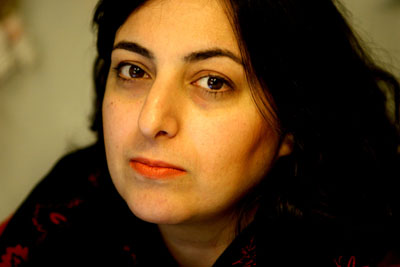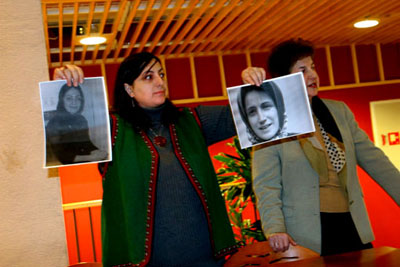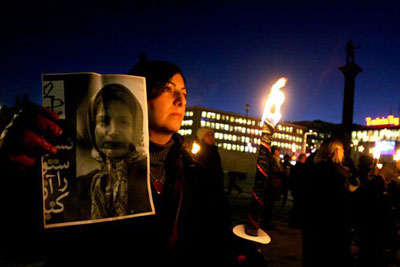“Wings are not Enough”: An Interview with Asieh Amini
by Carolyn Supinka / May 16, 2011 / No comments
In 2006, two young people were found guilty of adultery and murder in Mashhad, Iran. They were taken to a cemetery and stoned to death, despite the Islamic Republic of Iran’s insistence that stoning is no longer in practice. No reporters were present, and the event wasn’t recorded. But witnesses began to talk, and news of the incident reached journalist Asieh Amini, who investigated and eventually reported on the incident.
The story started a movement: The Stop Stoning Forever Campaign tracks and reports on cases of stoning and has successfully intervened in a number of cases, saving people’s lives.
In March 2007, after being held for five days in Iran’s notorious Evin Prison for protesting the imprisonment of fellow activists, Amini left Iran and is currently living in exile in Norway. There she continues to speak out against social injustice and write poetry and non-fiction. She spoke with Sampsonia Way via Skype about her exile, writing, and the power of social media in Iran.

Photo: courtesy of Asieh Amini
You are best known as a journalist, but you have carried your fight against stoning into the courtroom, where you presented bloody rocks that you collected.
When the campaigns against stoning began, the Iranian government officials continued denying that stoning had occurred. My organization decided to gather evidence.
I traveled to a town southeast of Tehran to prevent a stoning, but when I got there, it had already happened. There were still bloody stones on the ground. I collected several of the stones for DNA testing and linked the blood on them to the individual who had been murdered. The rocks were our evidence.
In 2007, the emotional stress of your job had become so great that you became severely ill and almost went blind. How do you cope with the tragedies you encounter in your work every day?
I believe that human rights workers must be trained to take care of themselves. It’s like when you are on an airplane, and the attendants tell you to first put the oxygen mask on your own face before helping the child next to you. I end up establishing relationships with the people involved in the cases I follow, and it’s difficult to write about a case in which an individual is executed.
For over a month, I suffered from headaches and eye pain, and the doctor told me that I needed to reduce my workload. Working for human rights in Iran has become an underground activity full of physical and emotional risk.
Just before this interview, I was told that a friend and fellow activist was hospitalized after she received news of her husband’s arrest.

Asieh raises awareness of stoning victims. Photo: courtesy of Asieh Amini.
You studied journalism at Allameh Tabatabai University in Tehran. What was your education like there?
My journalistic activities are not compatible with the education I received. As a journalist, you are taught to remain distant from your subject. But now I am more of an activist.
However, at the university I was taught by major figures of Iranian journalism, but when I actually worked, the field was associated with the power of the government and was forced to be conservative. Because of this, I left print media in 2006 and began writing articles for my website, which was later shut down.
When someone is stoned, they are first partially buried. Men are buried to their waist, and women up to their chest. You’ve said that the issue of women is deeper than the size of the hole they are buried in. What do you mean by that?
Iranian women face discrimination both in the courtroom and elsewhere in society.
In rural areas and traditional parts of cities, girls must get permission from their father or grandfather to choose their husband. According to Islamic law, women don’t have the right to divorce except in special situations that are very hard to prove in court. Men can divorce their wives for many excuses, including “not being accommodating.”
Without permission from their husbands, women can’t work, study, have passports, or go out of the house. Men can have four wives and tens of “temporal” wives, which is a term used to justify affairs. Due to these rules, men can flee punishment while women face stoning if they fall in love after marriage.
How did you first become interested in literature and writing poetry?
I don’t know if you can scientifically connect the gift of writing to genetics, but my father and sisters were all writers and authors. My older sisters are poets, and from a young age I was incredibly interested in their poetry. All of us read many books, and we participated in the poetry society of Shahsavar, the city in northern Iran where we lived. Some of the most memorable moments in my life are the Thursday nights when we sat in the library for hours, reading our poems and listening to the work of others.
Freedom is part of something larger. We need to raise a new generation in order to get freedom; a generation that knows what equality is and wants it too.
How has censorship impacted your ability to publish your work?
In my first book, parts of two poems were censored. There were also some parts I had to omit in order to prevent the banishment of the book. When I sent poems to magazines, I had to send poems according to the rules of the publication, and many poems were not published. I didn’t publish my second book in Iran because I would have had to remove many poems. I hope to publish it in Norway.
I’ve tried to publish some of my poems online, but I’m not sure yet if publishing the whole book online would be a good idea. Copyright rule is not observed in Iran, and these poems are my only fortune.
You were jailed in Evin Prison after protesting the imprisonment of activists who had been organized through a blog. How can blogging and social media help emancipate the Iranian people?
The Internet has eliminated geographical borders. I was the editor-in-chief of Zanan e Iran (Women of Iran), the first news website dedicated to Iranian women. We had an online committee of female authors who lived in different countries and were able to connect with many activists who had gotten out of the country.
There is still filtering online, but the virtual communities have raised awareness. I published a story online about a woman who was to be executed and through that we were able to collect money to compensate her accusers and save her life.

Asieh at a protest defending women’s rights. Photo: courtesy of Asieh Amini.
What potential does online communication have to generate real change in Iran?
I don’t see freedom as a bird that has to be captured; freedom is the flight itself. To have freedom, having wings is required but it’s not enough. You need to have the sky as well.
Internet and social media can be helpful in raising awareness, spreading information and criticizing ideas, but they are not enough. Freedom is part of something larger. We need to raise a new generation in order to get freedom; a generation that knows what equality is and wants it, too.
You are currently staying at an ICORN residence in Norway. Do you still keep in contact with activists in Iran? How has living in a country without restrictive censorship affected your writing?
I am trying to take advantage of the free environment, but many of my friends in Iran are in prison or under threats and security pressures. When I’m writing, I still think about those for whom my work could cause trouble.
But I have to admit that writing and thinking freely is an amazing experience. One of the most important parts of my time in Norway has been free access to the literature of exiled writers whose work is not available in Iran. For me this is just as important as writing without censorship.




